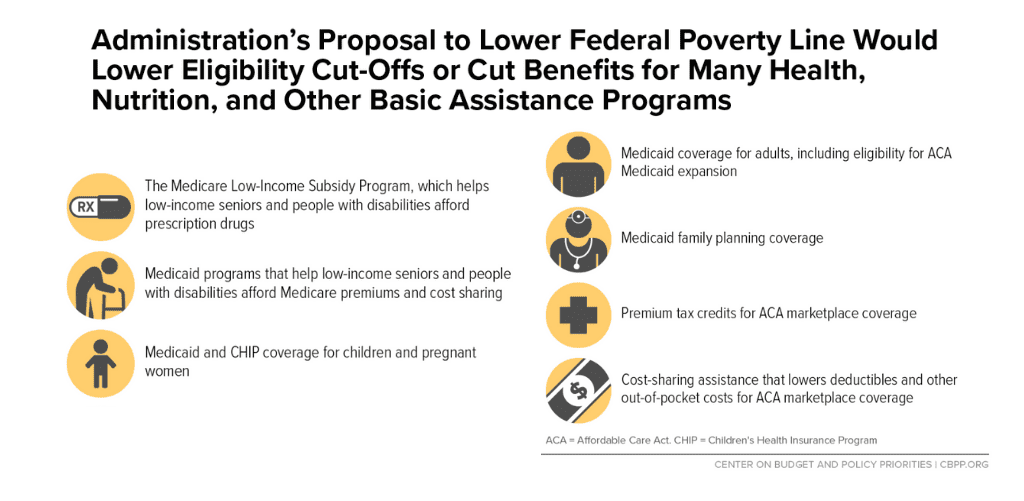Misguided numbers trick would “move the goal posts” and reduce health care, food, housing benefits and more for millions of Americans
Update: Read CPPP’s Public Comment Opposing the New Federal Proposal that would redefine U.S. Poverty Line
Overview: The U.S. Office of Management and Budget (OMB) issued a notice on May 6 requesting comments on changing the way annual inflation updates are calculated for the federal poverty line. OMB is seeking public comments on the idea of using one of two alternative, lower measures of inflation than the current measure.
Many basic needs programs that work with low-income people use the poverty guidelines as their eligibility thresholds, which are updated annually based on inflation. This new proposal would lower the dollar amounts of those updated poverty thresholds going forward, resulting in fewer low-income American households qualifying for help, or families getting reduced help from those programs. With each additional year of a smaller inflation update under the proposed change, the loss of services for Americans would grow.
Affected programs would include: The Supplemental Nutrition Assistance Program (SNAP, formerly known as food stamps); School meals; the Special Supplemental Nutrition Program for Women Infants, and Children (WIC); Medicaid and the Children’s Health Insurance Program (CHIP); Medicare help with premiums, co-payments and prescription medications; Affordable Care Act Marketplace assistance with premiums and out-of-pocket costs; family planning, home energy assistance; Head Start; Community and Migrant Health Centers; AIDS drug assistance; the Job Corps; the Community Services Block Grant, and legal services for the poor.
Take Action: Submit comments via this online portal before the June 21s deadline. Tell the OMB you oppose this rule change.
Then, help forward this information to more Texas organizations and communities to encourage them to comment.
Who Should Comment:
- Local and state elected officials and local health and human service agencies: if regulators use this change to reduce federal support for services, local governments will be left to fill the growing gap in unmet needs.
- Health care and social service providers, and their associations
- Food banks, food pantries, and other anti-hunger programs
- School districts and boards
- Advocacy organizations concerned with health care, hunger, poverty, child care, access to justice
Important Topics to Include in Comments:
- Directly address the OMB claim that the poverty level income guidelines today are more than adequate, and that they need to grow more slowly. Comment on the evidence from your work that the current federal poverty income guidelines are already well below what it takes to support a family, and that shrinking the inflation update will make the poverty guidelines an even less accurate measure of need.
- Tell OMB that before making a change that will result in a lower poverty income threshold, they must first do extensive research and in-depth analysis, including taking public comments, on: the numbers and types of Americans affected; safety, health, and developmental impacts; impacts on school districts; the fiscal impacts on households and local governments; and other impacts you expect to see among your constituents or the families you serve. (Why? OMB specifically stated that they are not seeking comments on how lowering the poverty guidelines would affect programs that use those guidelines. They are contemplating making this change without researching the impact first. Your comments can show that you expect major impacts on families and your community, and can call on the federal government to do that analysis before making this change.)
How to submit your comments:
- You can use this portal created by the Coalition for Human Needs; or
- Email your comments, addressed to: Nancy Potok, Chief Statistician, Office of Management and Budget, to Statistical_Directives@omb.eop.gov, using “Directive No. 14” in your subject line.
Why Comment?
This OMB request for comments is not part of an official rule-making proposal, so the requirements for taking public comments into account or responding to them are not as clear as for proposed rules. But diverse comments in the public record can achieve these important ends:
- Publicize the impact on people: loss of health, nutrition or other assistance. Comments can show who would be denied assistance, such as children, minorities, seniors, or people with disabilities.
- Question the validity of proposed changes to the inflation index: The Trump Administration has highlighted a specific alternative inflation adjustment, called the Chained Consumer Price Index for Urban Consumers (C-CPI-U). It rises about three-quarters of a percentage point more slowly than the measure now used to adjust the annual poverty measure. Research has indicated that the Chained CPI may not be valid for people who are poor or near-poor.
- Point out that any attempt to measure poverty accurately needs far more than a change in the inflation adjustment; it should take into account current estimates of income and expenditures. It should also take into account the evidence that people with incomes now defined as above the poverty threshold suffer considerable hardship (food insecurity, little or no savings, falling behind in rent or other bills, etc.)
- Raise questions that can be influential with important policy-makers or with the courts: Key members of Congress may weigh in with the Trump Administration to persuade them of the harm of such a change or work to prevent it via legislation. If there is litigation around changing the inflation adjustment, comments may guide court decisions.
More background reading, and answers to your questions:
- Coalition for Human Needs’ poverty line campaign page here, and
- Guide for leaving a detailed, high-quality comment here.
- Here is the 2-page FAQ on the Administration’s Proposal to Lower the Federal Poverty Line: https://www.chn.org/wp-content/uploads/2019/05/General-Poverty-Line-FAQ.pdf
- From the Center on Budget and Policy Priorities:
